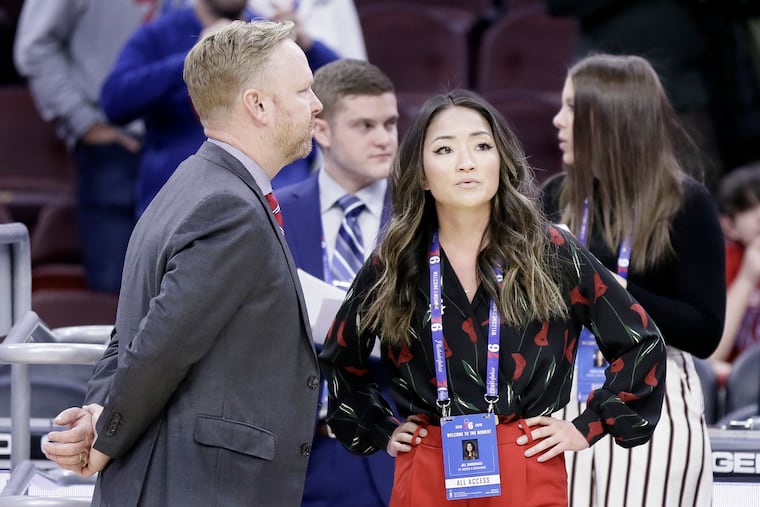Chris Heck and the Sixers just learned a hard lesson about Philly and its sports fans | Mike Sielski
The 76ers' president failed to understand a basic truth: You can't tell Philly fans who they ought to be.

So Chris Heck, the 76ers' president of business operations, cannonballed into a pot of boiling water on Thursday. He gave an interview to Uni Watch, a news site devoted to sports uniforms, and in trying to explain why the franchise designed its new jerseys as it did – black, with the word PHILADELPHIA splayed under a rendition of Boathouse Row – Heck said the following:
“We actually don’t use the term ‘Philly’ because we think it’s lazy and undersells the city, and sometimes I think ‘blue collar’ does the same thing. We refer to it as ‘New Philadelphia.’ Blue collar’s important for the city, but it’s not the only component. ‘New Philadelphia’ is about the arts, it’s about culture, it’s about education, it’s about diversity. We like that narrative more than the blue collar hockey thing.”
Once the interview transcript was injected into the social-media bloodstream, there was an immediate, and mostly negative, reaction, one that forced Heck to apologize later Thursday. He seemed to be suggesting that the Sixers were trying to change how the team defined itself and its fans defined themselves, and naturally, many of those fans recoiled from such arrogance.
The ridiculing complaints varied and, often, were justified. Referring to the city as “New Philadelphia” implied that there was something wrong with old Philadelphia, and expressing that sentiment is the fastest way to get a Yards Pale Ale poured on your head. The Flyers objected on Twitter to Heck’s objection to “the blue collar hockey thing,” as did those Philadelphians who found Heck’s scoffing at that aspect of the region’s cultural milieu to reek of privilege and elitism. And the notion that “Philly” is lazy and diminishes the city was laughable on its face. “Philly” is an affectionate bit of shorthand that residents use all the time, and can you imagine Nick Foles trotting to the sideline in Super Bowl LII and asking Doug Pederson, “You want Philadelphia-Philadelphia?” The Eagles would’ve been hit with a delay-of-game penalty by the time Foles finished spitting all those marbles out of his mouth.
(Personally, I was more offended that the Sixers apparently had ripped off the design for their new unis from the 1985-86 Denver Nuggets and hadn’t even bothered to pay Fat Lever a royalty fee. But as I said, I see the merits of the other objections, too.)
From a higher vantage point, though, what Heck’s comments and the backlash they inspired demonstrated was the volatile and tricky nature of tribalism in our society. When there’s too much of it in the body politic, you get polarization and boarded-up storefronts and a default posture of antagonism and defensiveness that corrodes the very social bonds that allow us to live among one another in peace. But in sports, tribalism is a healthier force. Our livelihoods and our values and the direction of the country don’t depend on the outcomes of ballgames, and a strong geographic/cultural identity and an us-vs.-them mentality actually spice up the whole enterprise.
There’s a reason that, generally speaking, football fans around here have regarded the Dallas Cowboys as the Eagles' primary rival, and it’s not just that the two teams have been in the same division for the last 53 years. It’s that the Cowboys were “America’s Team,” that their home city was defined by oil barons and gleaming glass skyscrapers and the smug superiority that comes with wealth, extravagance, and a football team that has won five Super Bowls. If you can’t see how that image contrasts with the Eagles, their history, their fans, and Philadelphia’s collective perception of itself, you haven’t spent nearly enough time here.
Now, of course, that sense of loyalty and identity, when it becomes excessive, can lead to the sort of anger and resentment that compels a football team to install a courtroom and jail in its stadium. But in a smaller proportion or dose, that dynamic – the blinkered passion for the local teams, the fan base’s long institutional memory, the self-identification as underdogs – is a big part of what makes Philadelphia sports so much fun. That reality isn’t changing anytime soon, and a sports franchise here, if it’s being smart, can’t just ignore it.
For example, it’s one thing for the Flyers to recognize and acknowledge that professional hockey has evolved over time, that stacking a roster with muckers and grinders and fist-throwers isn’t likely to lead to success in the 21st-century NHL, and that they should build their team accordingly. It’s another thing for the franchise, as it has done in recent years, to design an in-game experience at the Wells Fargo Center that treats its fans as if they have never seen a hockey game before. They have, and they cherish the team’s past, and they don’t want anyone condescending to them.
Guess what? Sixers fans aren’t all that different, as Chris Heck surely has learned by now. Too bad for him it was so hard a lesson.